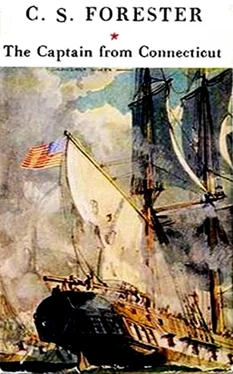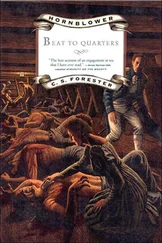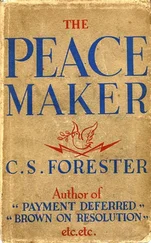Cecil Scott C. S. Forester - The Captain from Connecticut
Здесь есть возможность читать онлайн «Cecil Scott C. S. Forester - The Captain from Connecticut» — ознакомительный отрывок электронной книги совершенно бесплатно, а после прочтения отрывка купить полную версию. В некоторых случаях можно слушать аудио, скачать через торрент в формате fb2 и присутствует краткое содержание. Жанр: unrecognised, на английском языке. Описание произведения, (предисловие) а так же отзывы посетителей доступны на портале библиотеки ЛибКат.
- Название:The Captain from Connecticut
- Автор:
- Жанр:
- Год:неизвестен
- ISBN:нет данных
- Рейтинг книги:3 / 5. Голосов: 1
-
Избранное:Добавить в избранное
- Отзывы:
-
Ваша оценка:
- 60
- 1
- 2
- 3
- 4
- 5
The Captain from Connecticut: краткое содержание, описание и аннотация
Предлагаем к чтению аннотацию, описание, краткое содержание или предисловие (зависит от того, что написал сам автор книги «The Captain from Connecticut»). Если вы не нашли необходимую информацию о книге — напишите в комментариях, мы постараемся отыскать её.
The Captain from Connecticut — читать онлайн ознакомительный отрывок
Ниже представлен текст книги, разбитый по страницам. Система сохранения места последней прочитанной страницы, позволяет с удобством читать онлайн бесплатно книгу «The Captain from Connecticut», без необходимости каждый раз заново искать на чём Вы остановились. Поставьте закладку, и сможете в любой момент перейти на страницу, на которой закончили чтение.
Интервал:
Закладка:
“She’s a ship, sir, under tops’ls. Same course as us, sir, or pretty nigh.”
The captain took Hubbard’s glass and swung himself into the mizzen rigging, running up the ratlines with the quite surprising agility of a big man. He was back again on deck shortly after, sliding down the backstay despite the handicap of his heavy clothing. Hubbard was not used to captains as athletic as that. The captain’s hard face was set like a stone mask.
“That’s the two-decker we passed last night, Mr. Hubbard,” he said. “Turn up the hands. I’ll have a reef out of those tops’ls, if you please. Set the jib and mizzen stays’l, too.”
“Aye aye, sir.”
All hands came pouring on deck as Hubbard shouted his orders, while Peabody walked aft to the taffrail and stared astern. The fresh canvas as it was spread crackled loudly behind him, and the Delaware plunged madly under the increased pressure. Peabody swung round to watch his ship’s behaviour. In a full gale like this he was exposing more canvas than he should do in prudence. There was a risk that something might give way, that some portion of the rigging might part—leaving out of all account the possibility that he might run the Delaware bodily under. But if he did not take that risk the British ship would overhaul him. It was only under present conditions that a British ship of the line stood any chance in a race with an American frigate. The bigger ship, with her immensely strong gear, could make more sail than he dared, and her bluff bows and lofty freeboard which made her so clumsy on a wind were a huge advantage when running before a gale on a rough sea. By ensuring her appearance nearly dead to windward Providence had secured all these advantages for the British ship. But then, on the other hand, if she had appeared to leeward, although the Delaware could escape from her easily enough close-hauled, close-hauled she would be headed back for Montauk Point, back to the confinement of blockade—possibly straight into the waiting arms of the blockading squadron. What Providence took away in one fashion she restored in another, keeping an even balance so that a man’s success or failure depended entirely on himself, as it should be.
Hubbard was looking up at the straining topmasts. There was a distinct sign of a whip there—they were bending, very slightly, but perceptibly to the naked eye. What the strain was upon backstays and preventer braces could only be imagined; the tautness of the rigging had driven the perennial Aeolian harping of the wind quite a semitone up the scale. Hubbard turned to meet his captain’s eye, and went as far in protest as to open his mouth, and then thought better of it, and shut his mouth and resumed his pacing of the deck, where the hands were at work shovelling away the snow. Peabody watched the antics of his ship for a moment longer, noting how low she lay in the water when the pressure of the wind forced her downwards in certain combinations of waves, noticing how the water boiled away from her bows, and then turned back to stare over the taffrail again. The Delaware rose upon a wave, heaving up her stern above the mad flurry of grey water, climbing higher and higher as she pitched, and in the very instant of her stern’s highest ascent Peabody saw, far astern, on the very limit of the grey horizon, a tiny square of white. It was gone in a flash as the Delaware plunged down the farther slope, but Peabody knew it for what it was—the foretopsail of the British ship hoisted above the horizon for a moment. He had seen that foretopsail for a moment the night before; he had stared at it through his glass for two full minutes this morning, and he would recognize it again at any time in any part of the world. The sight of it from the deck meant that it was nearer, that his pursuer was overhauling him.
“Set the mizzen tops’l, Mr. Hubbard, with two reefs.”
“Aye aye, sir.”
“Have the relieving tackles manned, if you please.”
“Aye aye, sir.”
“Mr. Crane, take charge of them.”
“Aye aye, sir.”
Peabody had noticed the difficulty the quartermasters had in holding the Delaware on her course with the following sea—it was partly to help them that he had had the jib set. Now the pressure of the big mizzen topsail would add to their difficulties, countering the steadying effect of the headsails. Six men below at the relieving tackles, applied direct to the tiller ropes, would not only be of assistance in turning the rudder, but would also damp down the rudder’s sudden movements. And Mr. Crane, the sailing master, with his lifetime of experience—he had commanded in twenty voyages to the Levant out of Boston—would be the best man for the difficult task of correlating the work of wheel and relieving tackles; standing on the grating with his eyes on wheel and sails and sea, he would shout his warnings down to the tiller ropes.
Peabody watched warily as the mizzen topsail was sheeted home. The Delaware reacted to the added pressure instantly. There was nothing light or graceful about her movements now. She was crashing from wave to wave like a rock down a hillside. Even with the wind well abaft the beam as it was she was leaning over to it, the white foam creaming along her lee side to join her boiling wake.
“Mr. Murray, go aloft, and keep your eye on the strange sail.”
“Aye aye, sir.”
Peabody looked aft again, and at one of the Delaware’s extravagant plunges he once more caught that fleeting glimpse of the British topsail above the horizon. He did not need Murray’s hail from above.
“Deck, there! If you please, sir, I think she’s nearer.”
Peabody’s expression did not change. The Delaware was showing all the canvas she could possibly carry, and he had done all he could for the moment. If the wind would only drop a little, or the sea moderate, she would walk away from that tub of a two-decker. If not, it would only be by the aid of special measures that she would be able to escape, and those measures, which involved considerable sacrifice, he would not take until the necessity was proved.
“Why don’t we fight her, Jos?” asked Jonathan—when the crew were at quarters his station was on the quarterdeck at the captain’s orders, so that he was in his right place, but Josiah wondered sadly how long it would take the boy to learn the other details of naval life.
“You must take your hat off when you speak to me, Jonathan,” he said, “and you call me ‘sir,’ and you take your hand out of your pocket, too,” he repeated patiently—he had said it all before.
“Sorry, Jos—I mean sir,” said Jonathan, lifting his hat with the hand from his pocket. “But why don’t we fight her?”
He jerked his thumb over the taffrail to indicate the pursuing enemy.
“Because she’s twice as strong as we are,” said Josiah. “And with this sea running she’s three times as strong—we could never open our main-deck ports. And besides——“
Josiah checked himself. Anxious though he was for Jonathan to learn, this was not the time for a long disquisition on tactics and strategy. The two-decker had twice the guns the Delaware had, some of them heavier than the Delaware’s heaviest. She had scantlings twice as thick, too—half the Delaware’s shot would never pierce her sides. However heavy a sea was running she would always be able to work her upper deck guns as well as her quarterdeck and forecastle carronades, and her clumsy bulk made her a far steadier gun platform, too. From a tactical point of view it would be madness to fight her; and from a strategical point of view it would be worse than that. Here he was on the point of escaping into the open sea. Once let him get free, and he would exhaust England’s strength far more effectively than by any battle with a ship of the line. He could harass her fleet of merchantmen so that twenty frigates each as big as the Delaware would be engaged in convoy duty. He could be here to-day and there to-morrow, threatening a dozen places at once. The brigs and the sloops with which England guarded her convoys from privateers would be useless against a powerful frigate. If anything could force England into peace it would be the sort of pressure the Delaware could apply. There was nothing whatever to be gained by an immediate encounter with a superior force—such an encounter could only end in his having to put back for repairs and submitting once more to blockade.
Читать дальшеИнтервал:
Закладка:
Похожие книги на «The Captain from Connecticut»
Представляем Вашему вниманию похожие книги на «The Captain from Connecticut» списком для выбора. Мы отобрали схожую по названию и смыслу литературу в надежде предоставить читателям больше вариантов отыскать новые, интересные, ещё непрочитанные произведения.
Обсуждение, отзывы о книге «The Captain from Connecticut» и просто собственные мнения читателей. Оставьте ваши комментарии, напишите, что Вы думаете о произведении, его смысле или главных героях. Укажите что конкретно понравилось, а что нет, и почему Вы так считаете.












